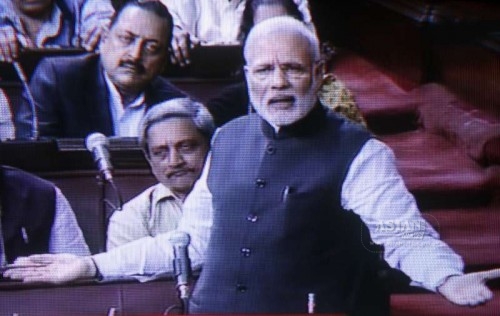
The Lok Sabha here passed the contentious land acquisition bill amid a walkout by opposition parties even as the government moved nine amendments to address concerns raised by farmers.
Shiv Sena, an ally of the Bharatiya Janata Party, abstained during the voting.
The proposed legislation removes the need for obtaining consent of land-owners and carrying out social impact assessment (SIA) for acquiring land under certain categories — precisely the provisions which had raised the heckles of critics.
Rural Development Minister Birender Singh, who took potshots at the Congress, his former party, moved nine official amendments, which were adopted.
With opposition members repeatedly insisting on division to register their disagreement, it took more than an hour for the bill to be passed after the minister’s reply to nearly eight-hour debate.
The Right to Fair Compensation, Rehabilitation and Transparency in Land Acquisition, Rehabilitation and Resettlement Bill, 2015 faces a tough call in the Rajya Sabha where the government is in minority.
Opposition leaders in the upper house have already hinted that they would try and send the bill to a Standing or Select Committee.
The Congress, which had moved a number of amendments in the Lok Sabha — all were negated — demanded that the bill be sent to the Standing Committee.
“They have not accepted even a single amendment proposed by us. This bill is anti-farmer. So we are walking out,” said Congress leader of the house Mallikarjun Kharge.
The CPI-M, CPI, AAP, RJD, JD-S and Samajwadi Party, Trinamool Congress members did the same.
Biju Janata Dal members had walked out minutes earlier. Shiv Sena leader and union minister Anant Geete indicated that the party was likely to abstain during voting in the Rajya Sabha also.
“We wanted to convey that land of farmers should be taken with their consent. The decision (to abstain) was not to put the government in trouble. It will continue (in Rajya Sabha),” Geete told IANS.
Road transport minister Nitin Gadkari told IANS that the bill will speed up development and create new employment.
The government has an option of calling a joint session of both houses to pass the bill, which the opposition says, favours corporates at the cost of farmers whose land will be taken away for business and infrastructure projects.
The bill will replace an ordinance promulgated by the government in December last year which amended the earlier law passed by the Congress-led UPA in 2013.
Civil society and farmers’ organisations staged a major protest here in the last week of February against the bill.
The nine amendments proposed included removal of social infrastructure in he exempted category, survey of wasteland, compulsory employment to at least one member of affected family and acquisition of land up to only one km on both sides of designated railway lines or roads for industrial corridors.
Replying to concerns of the members, Birender Singh said: “Social impact assessment” had been left to the state governments.
Hitting out at the opposition, mainly the Congress, the minister said certain parties opposing the land bill have been selective while espousing farmers’ causes.
Amid uproar by opposition parties, he said: “You don’t have the courage to say the right things.”
“When farmers are being looted in Haryana, then it doesn’t matter,” he said, in an apparent refernce to the time when the state was ruled by the Congress. “This can’t go on.”
Noting that he will never accept anything against interest of farmers, Birender Singh said that farmers need to move towards productive employment as share of agriculture had come down 52 percent of GDP to 15 percent over the last six decades.
The minister said Congress chief ministers also wanted changes in the Act passed by the UPA government and the bill protects interests of farmers.
Gaurav Gogoi of the Congress party said the bill passed in 2013 ensured equal rights to everyone. “If there was anybody who was walking shoulder to shoulder with farmers, it was Rahul Gandhi… You sacrificed farmers’ interests for corporates. The amendments are just cosmetic changes.”